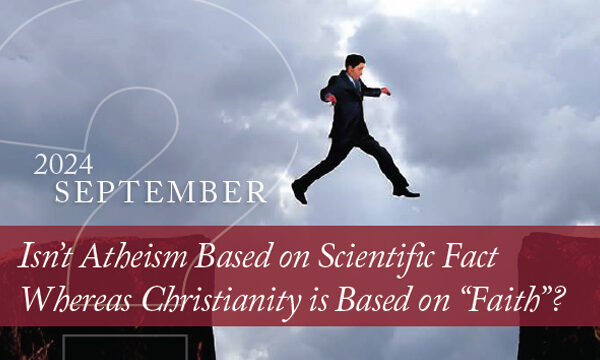Back to series
 General revelation is so called because everyone receives it, just by virtue of being alive in God’s world. This has been so from the start of human history. God actively discloses these aspects of himself to all human beings, so that in every case failure to thank and serve the Creator in righteousness is sin against knowledge, and denials of having received this knowledge should not be taken seriously. God’s universal revelation of his power, praiseworthiness, and moral claim is the basis of Paul’s indictment of the whole human race as sinful and guilty before God for failing to serve him as we should (Rom. 1:18-3:19)
General revelation is so called because everyone receives it, just by virtue of being alive in God’s world. This has been so from the start of human history. God actively discloses these aspects of himself to all human beings, so that in every case failure to thank and serve the Creator in righteousness is sin against knowledge, and denials of having received this knowledge should not be taken seriously. God’s universal revelation of his power, praiseworthiness, and moral claim is the basis of Paul’s indictment of the whole human race as sinful and guilty before God for failing to serve him as we should (Rom. 1:18-3:19)



General Revelation & Guilt
from the book: Concise Theology: A Guide to Historic Christian Beliefs
The heavens declare the glory of God,
the skies proclaim the work of his hands.
PSALM 19:1
Click here to open a Print - Friendly PDF
God’s world is not a shield hiding the Creator’s power and majesty. From the natural order it is evident that a mighty and majestic Creator is there. Paul says this in Romans 1:19-21, and in Acts 17:28 he calls a Greek poet as witness that humans are divinely created. Paul also affirms that the goodness of this Creator becomes evident from kindly providences (Acts 14:17; cf. Rom. 2:4), and that some at least of the demands of his holy law are known to every human conscience (Rom. 2:14-15), along with the uncomfortable certainty of eventual retributive judgment (Rom. 1:32). These evident certainties constitute the content of general revelation.
 General revelation is so called because everyone receives it, just by virtue of being alive in God’s world. This has been so from the start of human history. God actively discloses these aspects of himself to all human beings, so that in every case failure to thank and serve the Creator in righteousness is sin against knowledge, and denials of having received this knowledge should not be taken seriously. God’s universal revelation of his power, praiseworthiness, and moral claim is the basis of Paul’s indictment of the whole human race as sinful and guilty before God for failing to serve him as we should (Rom. 1:18-3:19)
General revelation is so called because everyone receives it, just by virtue of being alive in God’s world. This has been so from the start of human history. God actively discloses these aspects of himself to all human beings, so that in every case failure to thank and serve the Creator in righteousness is sin against knowledge, and denials of having received this knowledge should not be taken seriously. God’s universal revelation of his power, praiseworthiness, and moral claim is the basis of Paul’s indictment of the whole human race as sinful and guilty before God for failing to serve him as we should (Rom. 1:18-3:19)God has now supplemented general revelation with the further revelation of himself as Savior of sinners through Jesus Christ. This revelation, given in history
…what may be known about God
is plain to them,
because God has made it plain to them.
ROMANS 1:19
Scripture assumes, and experience confirms, that human beings are naturally inclined to some form of religion, yet they fail to worship their Creator, whose general revelation of himself makes him universally known. Both theoretical atheism and moral monotheism are natural to no one: atheism is always a reaction against a pre-existing belief in God or gods, and moral monotheism has only ever appeared in the wake of special revelation. Scripture explains this state of affairs by telling us that sinful egoism and aversion to our Creator’s claims drive humankind into idolatry, which means transferring worship and homage to some power or object other than God the Creator (Isa. 44:9-20; Rom. 1:21-23; Col. 3:5). In this way, apostate humans “suppress the truth” and have “exchanged the glory of the immortal God for images made to look like mortal man and birds and animals and reptiles” (Rom. 1:18, 23). They smother and quench, as far as they can, the awareness that general revelation gives them of the transcendent Creator Judge, and attach their ineradicable sense of deity to unworthy objects. This in turn leads to drastic moral decline, with consequent misery, as a first manifestation of God’s wrath against human apostasy (Rom.1:18, 24-32).
 Nowadays in the West people idolize and, in effect, worship secular objects such as the firm, the family, football, and pleasant feelings of various kinds. But moral decline still results, just as it did when pagans worshipped literal idols in Bible times.
Nowadays in the West people idolize and, in effect, worship secular objects such as the firm, the family, football, and pleasant feelings of various kinds. But moral decline still results, just as it did when pagans worshipped literal idols in Bible times.
Human beings cannot entirely suppress their sense of God and his present and future judgment; God himself will not let them do that. Some sense of right and wrong, as well as of being accountable to a holy divine judge, always remains. In our fallen world all whose minds are not in some way impaired have a conscience that at some points directs them and from time to time condemns them, telling them that they ought to suffer for wrongs they have done (Rom. 2:14ff); and when conscience speaks in these terms it is in truth the voice of God.
Fallen humankind is in one sense ignorant of God, since what people like to believe, and do in fact believe, about the objects of their worship falsifies and distorts the revelation of God they cannot escape. In another sense, however, all human beings remain aware of God, guiltily, with uncomfortable inklings of coming judgment that they wish they did not have. Only the gospel of Christ can speak peace to this distressful aspect of the human condition.

J.I. Packer
J.I. Packer, Author, (1926 – 2020), known for his best-selling book, Knowing God, as well as his work as an editor for the English Standard Version of the Bible. He was a signer on the 1978 Chicago Statement on Biblical Inerrancy, a member on the advisory board of the Council on Biblical Manhood and Womanhood, and also was involved in the ecumenical book Evangelicals and Catholics Together in 1994. His last teaching position was as the board of governors' Professor of Theology at Regent College in Vancouver, British Columbia. He was awarded the St. Cuthbert's Cross at the Provincial Assembly of ACNA on 27 June 2014 for his "unparalleled contribution to Anglican and global Christianity."

 COPYRIGHT: This publication is published by C.S. Lewis Institute; 8001 Braddock Road, Suite 301; Springfield, VA 22151. Portions of the publication may be reproduced for noncommercial, local church or ministry use without prior permission. Electronic copies of the PDF files may be duplicated and transmitted via e-mail for personal and church use. Articles may not be modified without prior written permission of the Institute. For questions, contact the Institute: 703.914.5602 or email us.
COPYRIGHT: This publication is published by C.S. Lewis Institute; 8001 Braddock Road, Suite 301; Springfield, VA 22151. Portions of the publication may be reproduced for noncommercial, local church or ministry use without prior permission. Electronic copies of the PDF files may be duplicated and transmitted via e-mail for personal and church use. Articles may not be modified without prior written permission of the Institute. For questions, contact the Institute: 703.914.5602 or email us.
-
Recent Podcasts
Making Sense of Science and Faith – Sharon’s Story
by Sharon Dirckx, Jana Harmon on September 13, 2024Dr. Sharon Dirckx was raised in a secular...Read More
-
Dismantling Atheism – Daniel’s Story
by Jana Harmon, Daniel on August 30, 2024
-
How J.R.R. Tolkien and C.S. Lewis Rediscovered Faith, Friendship, and Heroism
by Joseph Loconte, Aimee Riegert on August 23, 2024
-
Recent Publications
Isn ’t Atheism Based on Scientific Fact Whereas Christianity is Based on “Faith”?
by Cameron McAllister on September 1, 2024I once led a dialogue at the University...Read More
-
A Christian Response to Anti-Semitism
by Darrell Bock, Randy Newman, Thomas A. Tarrants on August 15, 2024
-
What Scientific Proof Do We Have That There Is a God?
by Christopher L. Reese on August 1, 2024
0
All Booked
0.00
All Booked
0.00
All Booked
22667
GLOBAL EVENT: Is God Just, Not Fair? with Jennifer Rothschild, 8:00PM ET
https://www.cslewisinstitute.org/?event=global-event-is-god-just-not-fair-with-jennifer-rothschild-800pm-et&event_date=2024-09-20®=1
https://www.paypal.com/cgi-bin/webscr
2024-09-20

Next coming event
Days
Hours
Minutes
Seconds
GLOBAL EVENT: Is God Just, Not Fair? with Jennifer Rothschild, 8:00PM ET
On September 20, 2024 at 8:00 pmSpeakers
Team Members

J.I. Packer
J.I. Packer, Author, (1926 – 2020), known for his best-selling book, Knowing God, as well as his work as an editor for the English Standard Version of the Bible. He was a signer on the 1978 Chicago Statement on Biblical Inerrancy, a member on the advisory board of the Council on Biblical Manhood and Womanhood, and also was involved in the ecumenical book Evangelicals and Catholics Together in 1994. His last teaching position was as the board of governors' Professor of Theology at Regent College in Vancouver, British Columbia. He was awarded the St. Cuthbert's Cross at the Provincial Assembly of ACNA on 27 June 2014 for his "unparalleled contribution to Anglican and global Christianity."






